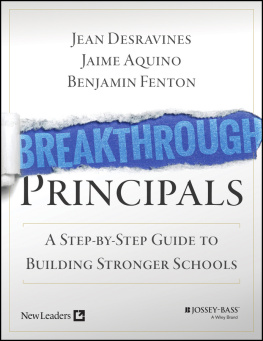Leading High-Performance School Systems
Lessons from the World's Best
Marc Tucker
Table of Contents
Publisher's note: This e-book has been formatted for viewing on e-reading devices.
Select "Publisher Defaults," if your device offers that option, for best viewing experience.
If you find some figures hard to read on your device, try viewing through an application for your desktop or laptop computer, such as Adobe Digital Editions (www.adobe.com/products/digitaleditions).
ASCD 2019
Foreword
....................
Americans are known around the world as innovatorssomething that is as true in education as it is in medicine, business, and technology. Visit any of the top-ranked places of the worldSingapore, Shanghai, Canada, or Finlandand examine pioneering practices in teaching, educator preparation, or assessment, and you will no doubt be told about US origins for many of their reforms.
However, rather than allowing these practices to remain as boutique exceptions to the rule, these countries have taken good ideas from the US, from other countries, and from their own experiences and have used them to transform their systems of education. They not only scale up good ideas, they also build on what they have learned from processes of continuous improvement over time, rather than shifting ideologies and policies with the pendulum swings of politics.
In short, they build systems of education that create a foundation of adequate, well-directed resources; strong teaching; and thoughtful curriculum and assessment for all schools, not just for a lucky few. In this important book, Marc Tucker describes how this system-building is accomplished. Tucker has been studying and describing systems for many years, helping to shape the understanding of both policymakers and practitioners who are on a quest to ensure that all children learn to high levels and have the opportunity to fulfill their potential.
At the start of this book, he notes how hard U.S. educators are working to try to make progress. "That's because the systemdesigned a century ago to solve a very different set of problems than the ones the nation now facesdoes not work anymore. Simply managing current systems is getting harder and harder. That will continue until we replace them with systems that are much better adapted to the challenges we now face."
These challenges include the need for a much more highly educated populacemaking available to virtually all students the kind of thinking curriculum once available to a very small eliteand the need for teaching that can address the wide diversity of student experiences and needs in US schools. This requires a much more systematic and serious set of investments in the training of teachers and school leaders, so that all of them can be as well-prepared as the best currently are. It also requires an infrastructure of ongoing learning supports, including cultivation and recognition of teaching expertise in ways that allow it to be tapped in all schools.
Over the course of his career, Marc Tucker has made extraordinary contributions to developing these kinds of learning supports in the US: During the 1980s, he was responsible, with the Carnegie Corporation of New York, for the launch of the National Board for Professional Teaching Standardsthe first body to convene accomplished teachers to develop standards for the profession and to create authentic assessments of teaching to certify accomplished teaching. In the last two decades, numerous studies have confirmed that Board-certified teachers are generally more effective than others, and that these teachers contribute to greater effectiveness for other teachers in their buildings. Board-certified teachers often observe that engaging in the process of certification was one of the most powerful learning experiences of their careerand one that changed their approach to teaching forever.
The Board's standards became the stimulus for similar initiatives all over the globe, and standards articulating what teachers should know and be able to do are now found in every leading nation as a framework for systematically guiding teacher recruitment, preparation, induction, ongoing professional learning, appraisal and feedback. In places like Singapore and Shanghai, they also guide the design of career ladders that develop expert teachers for all schools, so that the best teachers can serve as mentors and coaches for other teachers.
A few states in the US have, at moments in time, taken this kind of systematic approach to teaching standards, built an infrastructure for training that incorporates the standards, and even built in incentives for teachers to become Board-certified. As I described in The Flat World and Education , states like Connecticut and North Carolina that invested in standards-based reforms of teaching realized large gains in student achievement as a result of their efforts in the 1990s.
However, most states have continued to operate fragmented non-systems which allow substantial variability in the standards teachers meet before entry and substantial quality differentials across preparation institutions, fail to connect preparation with ongoing evaluation and professional development, and lack any means for recognizing and taking advantage of Board-certified teachers' skills, leaving these talented certified teachers "all dressed up with no place to go."
Equally important are the skills of school leaders to create systems of support for high-quality teaching. Seeing little training infrastructure available in the United States to help school principals learn these skills, Tucker and his National Center on Education and the Economy created the National Institute for School Leadership (NISL), now the largest program to train school leaders in the United States. Building on the best research on student learning and teacher development to create effective schools focused on 21st century skills, NISL is designed to give school superintendents, central office staff and principals the skills they need to design and run the kind of high performance schools and school systems described in this book.
A few years ago, Tucker and his team were asked by the National Conference of State Legislatures to support the work of a study group composed of state legislators assembled to report back to the whole association on the strategies used by the countries with the most successful education systems The result was a volume titled No Time to Lose , the biggest selling report in the history of the NCSL. The report succeeded in sounding the alarm by describing not only how far ahead of the states these countries are, and what is at stake, but also what states needed to do to catch up by putting all the policy components of high performing systemsearly childhood education, curriculum and assessment, resource distribution, teaching and school leadership, college and career readinessin place. Tucker and NCEE are now working with the state of Maryland to help build this kind of high performance education system. This work will hopefully help transform what is often an inchoate set of political decisions that bump around like a ball in a pinball machine into decisions that can instantiate a coherent approach to supporting schools that can, in turn, support teachers to teach and students to learn.















